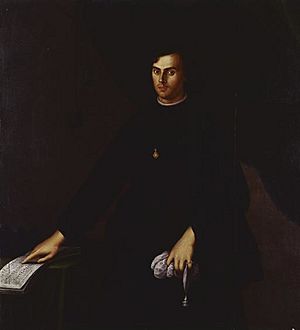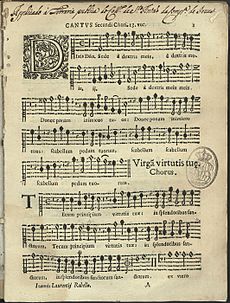João Lourenço Rebelo facts for kids
Quick facts for kids
João Lourenço Rebelo
|
|
|---|---|

Portrait by José de Avelar Rebelo, c. 1646.
|
|
| Born | 1610 Caminha, Minho Province
|
| Died | 16 November 1661 Loures, Estremadura Province
|
| Occupation | Composer |
João Lourenço Rebelo (born 1610, died 16 November 1661) was a famous Portuguese composer. He was special because he was the only Portuguese composer to use the "Venetian polychoral style." This means he wrote music for several groups of singers or instruments that would sing or play together, often from different places in a church. Even though he was good friends with King John IV of Portugal, Rebelo never actually worked officially for the royal family.
Contents
The Early Life of João Rebelo
João Lourenço Rebelo was born in Caminha, Portugal, in 1610. His parents were João Soares Pereira and Maria Lourenço Rebelo. When he was about 14 years old, in 1624, he joined the choir at the Ducal Palace of Vila Viçosa. This palace was the home of the Dukes of Braganza, a very important noble family. His older brother, Marcos Soares Pereira, also joined as a chaplain-singer.
Learning Music at the Palace
The Duke of Braganza at the time, Teodósio II, loved music. He created a special school for musicians at his palace called the Colégio dos Santos Reis Magos. This was where young Rebelo studied music.
One of his teachers was Robert Turner, an Irish musician. Turner had learned from a famous Flemish composer named Géry de Ghersem. Rebelo might also have studied with Friar Manuel Cardoso, who was one of Portugal's most famous composers back then.
People used to think Rebelo taught music to the Duke's son, João. But João was six years older than Rebelo. Instead, they became very good friends, and this friendship lasted their whole lives. João later became King John IV of Portugal.
Rebelo and King John IV
In 1640, Portugal went through a big change. The country had been ruled by Spain since 1580. But in December 1640, Portugal became independent again in what was called the Portuguese Restoration War. João, Rebelo's friend, became King John IV of Portugal.
When João became king, the ducal chapel (the group of musicians from the palace) moved from Vila Viçosa to Lisbon, the capital city. Both Rebelo and his brother Marcos moved with the King. In 1641, Marcos became the leader of the Royal Chapel's music.
Royal Recognition for Rebelo
In 1646, King John IV honored Rebelo. He made Rebelo a nobleman, which was a special title. He also made him a knight of the Order of Christ. This was a very important position that came with good financial benefits. Rebelo received an annual income from a special property.
In 1652, Rebelo got married to Maria de Macedo. Her father was the governor of Monção, another important person.
The King's Admiration for Rebelo's Music
King John IV truly admired Rebelo's music. We know this from three clear pieces of evidence:
- The King dedicated his own book about music to Rebelo.
- He wrote a letter to his agent in Rome, mentioning Rebelo's music.
- He included a special mention of Rebelo in his last will.
In his music book, the King wrote to Rebelo: "This book, written to defend modern music, is dedicated to you. I have seen your music books... and they will be published soon."
In a letter from 1654, the King said he was preparing Rebelo's music for printing. He mentioned "a complete series of vesper psalms, and other pieces for different choirs and voices by Juan Lourenço Rabelo."
Two days before he died, in 1656, King John IV wrote in his will: "I have ordered the works of João Rebello to be printed in Italy at my expense." He wanted 20 copies for his own library and the rest to be shared in other countries. Printing the music in Rome might have been a way to show Portugal's independence to the Pope.
In 1657, a collection of 33 of Rebelo's pieces was printed in Rome. These pieces were written between 1636 and 1653. The collection was called Joannis Laurentii Rabello Psalmi, tum Vesperarum tum Completarum. Item Magnificat, Lamentationes et Miserere. This means "Psalms, both of Vespers and of Compline. Also the Magnificat, the Lamentations and the Miserere by João Lourenço Rebelo."
Only one copy of this original edition survived for a long time. It was saved by an Italian priest named Fortunato Santini. Today, it is kept in a library in Münster, Germany. In 1982, a modern version of these works was published in Portugal. Some other original volumes are also kept in the National Library of Portugal.
João Lourenço Rebelo passed away in Apelação (Loures) on November 16, 1661.
Rebelo's Unique Musical Style
Sadly, most of Rebelo's music was lost in the terrible 1755 Lisbon earthquake that destroyed the Royal Music Library. Today, we only know about 44 of his compositions. Any ideas we have about his music come from these few surviving pieces.
Rebelo's music was a fascinating mix of old and new styles from the 1600s. A music expert named João Pedro d’Alvarenga described Rebelo's music as "a strange monument." He said it was like a strong building, focusing more on the sound itself than on the words. His music used many different combinations of voices and instruments. It also had demanding parts for instruments and fancy vocal decorations.
Blending Old and New Sounds
Rebelo's style was similar to composers from northern Italy in the 1600s. He likely had access to their music in King John IV's large music library. But he also kept the refined counterpoint (a way of combining melodies) that was common among older Portuguese composers.
He was one of the first Portuguese composers to write specific parts for instruments in his religious music. Even though he didn't always say which instruments to use, many of his pieces had parts labeled vox instrumentalis (instrumental voice). His music also included a basso continuo, which is a continuous bass line that provides the harmony.
Creating Musical Drama
Rebelo loved to create strong contrasts in his music. He mixed different groups of singers, solo singers, and instruments. For example, in his piece Educes me, he used a slow, steady melody (called a Cantus firmus) as a base. Over this, he added lively, complex music for six instruments.
In Super Aspidem, he repeated musical patterns many times. In Qui habitat, his music sounded like the charming madrigals (songs for several voices) by the famous Italian composer Claudio Monteverdi.
Rebelo also used the older style of the Roman School of polyphony. You can hear this in his seven-part song Panis angelicus, which has interesting harmonic changes. His Lamentationes also used striking chromatic harmonies, which create a very emotional sound.
It's thought that Rebelo's music wasn't often played in the Royal Chapel because he didn't have an official job there. The King himself said he "saw" Rebelo's music books, not that he "heard" his music. This suggests that Rebelo might have composed his music more for artistic ideas than for public performances. As Paul Van Nevel said, Rebelo saw music as "an absolute art with its own ideas." He composed music that either served the words or used the words as a background for pure musical expression.
Modern Editions
- Psalmi tum Vesperarum, tum Completorii: Item Magnificat Lamentationes e Miserere, Vol. I / João Lourenço Rebelo / 1982 / ISBN: 972-666-035-1
- Psalmi tum Vesperarum, tum Completorii: Item Magnificat Lamentationes e Miserere, Vol. II / João Lourenço Rebelo / 1982 / ISBN: 972-666-036-X
- Psalmi tum Vesperarum, tum Completorii: Item Magnificat Lamentationes e Miserere, Vol. III / João Lourenço Rebelo / 1982 / ISBN: 972-666-055-6
- Psalmi tum Vesperarum, tum Completorii: Item Magnificat Lamentationes e Miserere, Vol. IV / João Lourenço Rebelo / 1982 / ISBN: 972-666-054-8
Recordings
- 1996 Sacred Music from Seventeenth Century Portugal Melgás & Rebelo. The Sixteen, dir. Harry Christophers, Collins Classics 1465, reissued as Coro 16020
- 2000 Rebelo Vesper Psalms and Lamentations. Huelgas Ensemble, dir. Paul Van Nevel, Sony Vivarte 53115
- 2002 João Lourenço Rebelo Psalmi, Magnificat & Lamentationes. Currend, Erik van Nevel, Eufoda 1344
See also
 In Spanish: João Lourenço Rebelo para niños
In Spanish: João Lourenço Rebelo para niños
 | Delilah Pierce |
 | Gordon Parks |
 | Augusta Savage |
 | Charles Ethan Porter |


